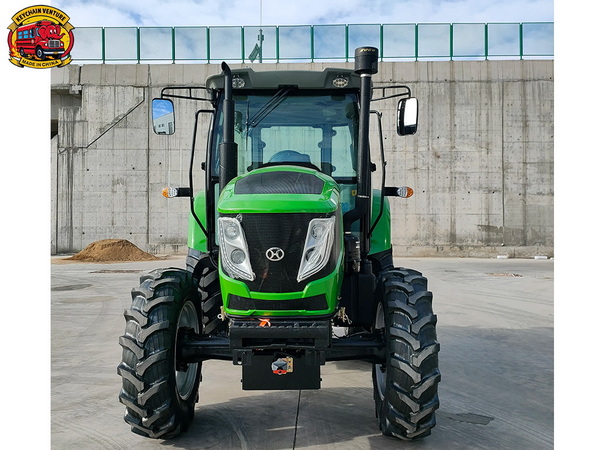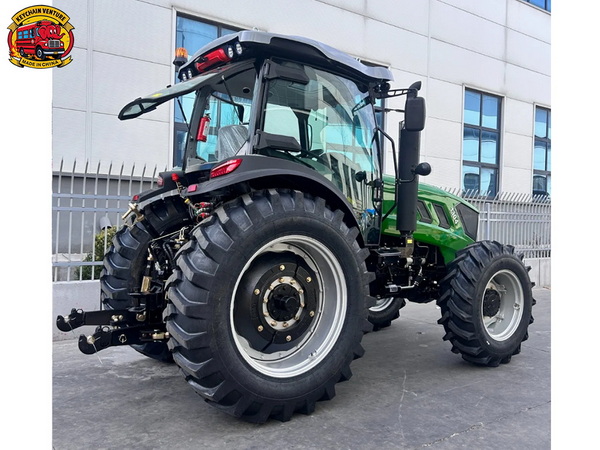Views: 222 Author: Amanda Publish Time: 2025-08-25 Origin: Site








Content Menu
● Understanding Tractor Trailers and Their Transmission Systems
● The Evolution of Transmission in Tractor Trailers
>> Manual vs Automatic Transmissions in Tractor Trailers
● Are Tractor Trailers Automatic? The Current Market Reality
● Benefits of Automatic and Automated Tractor Trailers
● Challenges of Automatic Transmissions in Tractor Trailers
● How Automatic Transmissions Work in Tractor Trailers
● Fuel Efficiency and Environmental Impact
● Driver Experience and Safety
● Trends in Autonomous and Smart Trucks
● Frequently Asked Questions (FAQs)
>> 1. Are most tractor trailers automatic or manual?
>> 2. What are the advantages of automatic transmissions in tractor trailers?
>> 3. Can automatic tractor trailers handle heavy loads as effectively as manuals?
>> 4. Are automatic transmissions more expensive to maintain in tractor trailers?
>> 5. Is switching from manual to automatic tractor trailers difficult for drivers?
Tractor trailers play a vital role in the global logistics and transportation industry, efficiently moving goods over long distances. As technology evolves, many drivers and fleet operators ask, “Are tractor trailers automatic?” This comprehensive article explores the transmission types used in tractor trailers, their advantages, challenges, and the future of automation in commercial trucking.

A tractor trailer typically refers to the combination of a tractor unit (the front vehicle with the engine and driver's cab) and one or more trailers attached to it. This configuration is commonly used for hauling freight domestically and internationally. Because of the heavy loads and long hauls, the transmission system in tractors is crucial for performance, fuel efficiency, and driver comfort.
Traditionally, tractor trailers have been equipped with manual transmissions due to the demanding nature of hauling heavy loads. However, modern advancements now offer automatic and semi-automatic options, challenging the status quo.
In the past, tractor trailers were almost exclusively manual transmission vehicles. Drivers controlled gear shifts manually, allowing precise torque control and better adaptability to varying load demands and terrains. Such systems often featured 10, 13, or even 18-speed gearboxes.
However, manual transmissions can be physically demanding and require skill to drive efficiently. This gave rise to the development of automated manual transmissions (AMTs) and fully automatic transmissions tailored for tractor trailers.
The core difference lies in how the gears are shifted:
- Manual transmission: The driver manually engages the clutch and changes gears using a shift lever.
- Automated Manual Transmission (AMT): A manual gearbox controlled electronically to automate clutch engagement and gear shifting.
- Fully automatic transmission: Uses a torque converter and planetary gearsets to enable gear changes without driver input.
Most modern tractor trailers use AMTs, such as those manufactured by Eaton or Allison, combining fuel efficiency with lower driver fatigue.
The simple answer is: It depends. While many tractor trailers now come equipped with some form of automated or full automatic transmission, manual transmissions remain popular in various regions due to cost, maintenance preferences, and driver skill availability.
In North America and Europe, automated and fully automatic tractor trailers are increasingly common. Fleet operators prioritize fuel savings and reduced driver fatigue, which automated systems offer. Conversely, in some developing markets, traditional manual tractors still dominate due to lower upfront costs and easier maintenance.
Transitioning from manual to automatic or automated transmissions offers several clear advantages:
- Ease of Driving: Drivers can focus more on road awareness instead of frequently shifting gears, reducing fatigue during long hauls.
- Fuel Efficiency: Automated systems optimize shifting points, which can improve fuel consumption compared to inconsistent human shifting.
- Lower Driver Skill Requirement: Automatics lower the learning curve for operating tractor trailers, helping address driver shortages.
- Reduced Wear and Tear: Computers ensure smoother gear engagement, reducing mechanical stress and maintenance costs.
These benefits contribute to improved operational efficiency and may lead to lower total cost of ownership for trucking companies that invest in automatic or automated tractor trailers.

Despite the benefits, some challenges remain with fully automatic or automated transmissions in tractors:
- Higher Initial Cost: Automatic systems are generally more expensive upfront compared to manual gearboxes.
- Complex Maintenance: Advanced electronics and control units require specialized service which not all workshops can provide.
- Driver Preferences: Experienced drivers sometimes prefer manual control, especially in rugged terrain or heavy load conditions.
- Compatibility: Some legacy or specialized trailers and equipment are optimized for manual transmission tractors.
These challenges influence the choice between manual and automatic transmissions in certain markets and use cases.
To understand why and how automatic transmissions are suitable for tractor trailers, it's important to grasp their operation principles.
Automated manual transmissions (AMTs) use electronic actuators to engage the clutch and select gears. Unlike fully automated transmissions in passenger vehicles, AMTs retain the mechanical efficiency of manual gearboxes but eliminate the need for a human to time clutch and shift actions precisely. This delivers a smooth and consistent shifting experience ideal for long-distance hauling.
Fully automatic transmissions, on the other hand, use torque converters instead of a clutch to transmit power. These systems typically have fewer gears but enable seamless driving without manual interventions. While common in mid-sized trucks or buses, fully automatic gearboxes in heavy tractor trailers have been less prevalent due to torque handling challenges but are gradually improving.
Fuel consumption remains one of the largest operating costs and environmental concerns for companies utilizing tractor trailers. Automated and automatic transmissions contribute positively by enabling gear shifts at optimal RPMs, reducing fuel wastage caused by improper shifting or delays.
Additionally, automated transmissions facilitate smoother vehicle movement in stop-and-go traffic and hilly terrains, which helps lower emissions. As regulatory pressures on carbon footprints increase internationally, adoption of fuel-efficient powertrains including automatic transmissions becomes more attractive.
For many truck drivers, long hours behind the wheel lead to fatigue, increasing the risk of accidents. Automatic and AMT-equipped tractor trailers ease the mental and physical strain by removing the constant need for shifting, clutch control, and gear hunting, allowing drivers to concentrate more on road conditions and navigation.
Furthermore, modern automatic transmissions often feature integrated safety technologies such as hill start assist, engine braking control, and adaptive cruise control compatibility. These systems collectively improve handling and safety margins, benefiting both drivers and other road users.
The future trajectory of tractor trailers involves not only automatic transmissions but also broader automation and connectivity functions.
Many trucking manufacturers and suppliers, including leading commercial vehicle providers, are developing autonomous driving capabilities where tractor trailers can perform parts of the driving task themselves. Transmission automation is a foundational step to full vehicle automation, as it removes the need for manual gear changes.
Smart telematics systems work alongside automated transmissions to monitor vehicle performance, predict maintenance needs, and optimize routes for time and fuel savings. These innovations position tractor trailers at the forefront of the “smart logistics” revolution.
Several factors influence how quickly automatic tractor trailers penetrate global markets:
- Cost Sensitivity: In price-sensitive regions, manual tractors continue to dominate due to affordability and simpler maintenance.
- Infrastructure: Availability of service centers equipped to handle automatic transmission diagnostics affects acceptance.
- Driver Training: Automated transmissions reduce training time but require initial familiarization.
- Regulation: Emission standards and driver hours regulations incentivize technologies that improve efficiency and rest.
KeyChain Venture Co., Ltd., as a leading Chinese commercial vehicle supplier, actively integrates automated transmission technology in its tractor trailer models to meet diverse market demands and regulatory requirements.
Whether for domestic freight or international logistics, understanding transmission types in tractor trailers is essential for fleet operators, drivers, and logistics planners. Automatic tractor trailers represent a significant step forward in operational efficiency and driver comfort without fully eliminating the role and preference for manual transmissions.
With ongoing innovations, automated transmissions will likely become the new standard over the coming decade, supporting China's position as a leading commercial vehicle supplier under companies like KeyChain Venture Co., Ltd. Investing in automatic technology today can help organizations future-proof their fleets and maintain competitive advantages in a rapidly evolving transportation landscape.

Currently, many modern tractor trailers use automated manual transmissions (AMTs), but manual transmissions are still widely used depending on region and operational needs.
They reduce driver fatigue, improve fuel efficiency, lower the skill needed for driving, and reduce transmission wear and maintenance.
Yes, modern automatic and AMT systems are designed specifically to handle heavy loads efficiently without compromising performance.
They can require more specialized diagnostics and repairs, making maintenance potentially higher-cost and more complex than for manual gearboxes.
The transition is generally positive, as automated systems simplify driving, but some experienced manual drivers may need time to adjust to the controls and response.